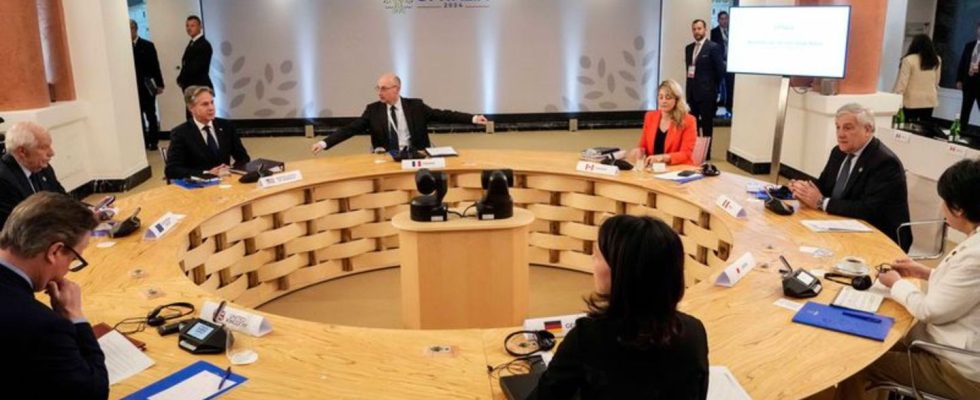Conflicts
G7 warns Israel and Iran against escalation
The G7 foreign ministers and the EU foreign policy chief at a round of talks in Capri, Annalena Baerbock in the front right. photo
© Gregorio Borgia/Pool AP/dpa
The last day of the meeting of the G7 foreign ministers in Capri was actually supposed to be about cyber security and China. But after reports of an Israeli attack on Iran, the Middle East is back in focus.
The seven large western industrial nations (G7) are facing one Expansion of the conflict in the Middle East warned. At the end of a meeting of G7 foreign ministers in Capri, Italy’s Foreign Minister Antonio Tajani called on “all sides to avoid escalation” on behalf of the Group of Seven. Now it’s about “de-escalation”.
At the same time, he condemned the massive Iranian attack on Israel last weekend. “We call on all parties to make a positive contribution,” said Tajani, adding: “We condemned Iran’s recent attack. The G7 supports Israel’s security, but we call on all parties to avoid escalation.”
The G7 consists of the USA, Canada, Japan, Great Britain, France, Italy and Germany. The annual G7 summit of heads of state and government takes place in the southern Italian region of Apulia in mid-June.
“All parties” called upon to “make a positive contribution”
The G7 ministers also adopted a joint declaration on this. With a view to efforts to de-escalate the situation, it says that “all parties in the region and beyond are called upon to make their positive contribution to this joint effort.” Iran is being asked to end its support for the Islamist Hamas. In addition, Tehran should refrain from actions that destabilized the Middle East, “including supporting the Lebanese Hezbollah and other non-state actors.”
Iran’s continued provision of weapons and related materials to the Houthis in Yemen violates a UN Security Council resolution and “leads to a dangerous escalation of tensions” in the region. The G7 is also calling on “all countries” to prevent the delivery of components or other goods for Iran’s drone and missile programs. China is not directly mentioned in this context. In addition, they are “extremely concerned about reports that Iran is considering transferring ballistic missiles and related technology to Russia.”
At the end of the three-day meeting in Capri, the main focus was on the relationship with China, cyber security and energy supply. The critical nutritional situation in many countries around the world should also become an issue. However, developments in the Middle East had already been an important topic before.

